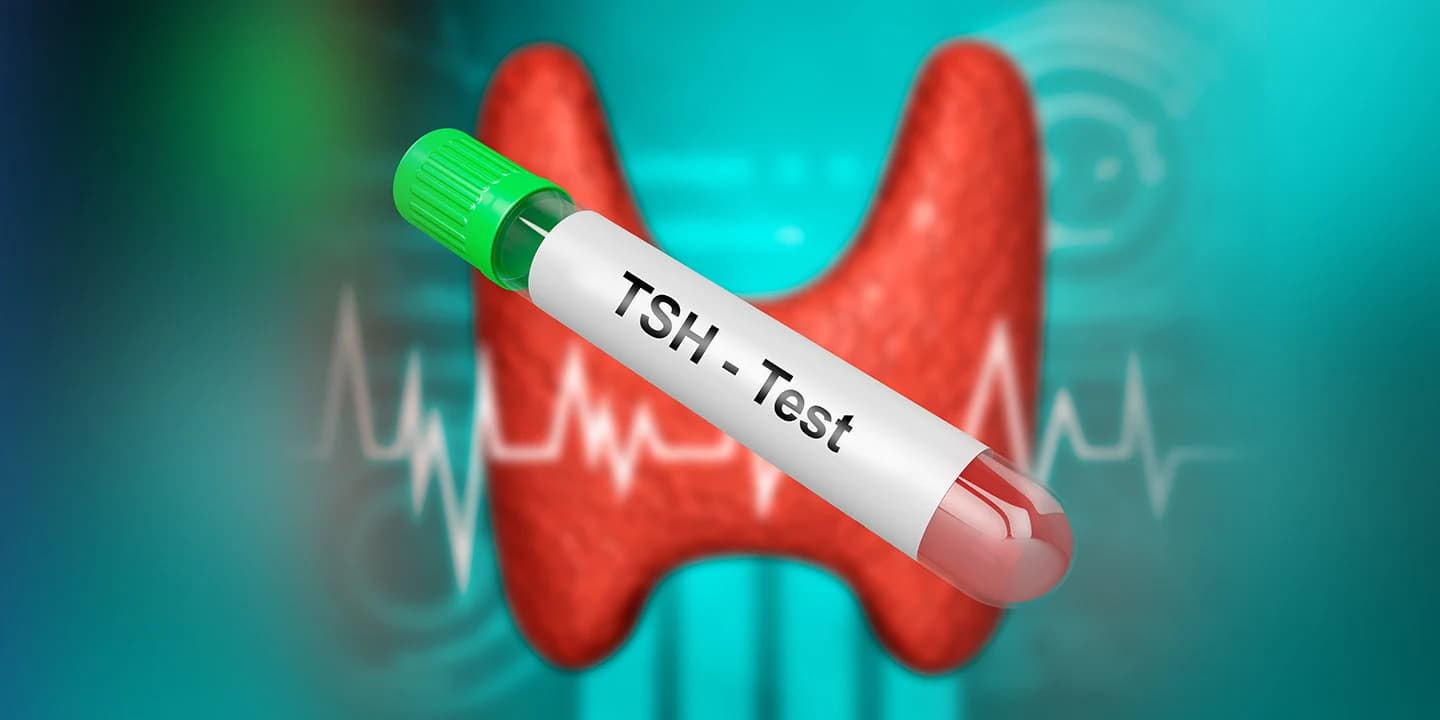TSH Test: What Is T3, T4, TSH Normal Range?

Medically Reviewed By
Dr Divya Rohra
Written By Srujana Mohanty
on Feb 17, 2024
Last Edit Made By Srujana Mohanty
on Mar 18, 2024

The thyroid is a crucial gland in our body responsible for producing a range of hormones that support the body’s metabolic activities. However, thyroid disorders are extremely subjective. The symptoms and the complications aren’t always universal or uniform in each patient.
Ever wondered why that happens? Besides the different types of thyroid disorders, the level of each thyroid hormone plays a crucial role in it. So, knowing about the functions of the thyroid gland and the significance of each hormone plays a crucial role in getting proper treatment throughout.
|
Do you often complain about tiredness and feeling cold out of the blue? Did you know these are early signs of thyroid disease? Your sudden weight gain or weight loss also indicates the possibility of thyroid disorder. Don’t let things get worse. Instead, find the right ways to mitigate the complications with timely testing. |
In this Article
- Thyroid Gland – Anatomical and Physiological Significance
- What Happens with High T3 and T4 Levels in the Blood?
- What Happens with Low T3 and T4 Levels in the Blood?
- TSH Hormone – Understanding the Significance and Functions
- What is the TSH test?
- What are some Unique Markers tested in the Thyroid Tests?
- How is a TSH Test Done?
- What Happens if my TSH Test Results are Abnormal?
- Natural Ways to Manage Thyroid Levels
- FAQs
- Conclusion
This article will explore everything there is to know about the thyroid gland, the hormones produced, and more about the TSH test and its significance in the diagnosis.
Thyroid Gland – Anatomical and Physiological Significance
Before we jump into exploring more about the TSH test, the different hormones like T3, T4, etc., it’s important to clarify the basics first.
The thyroid gland is a vital endocrine gland in our body. The collection of glands is responsible for producing a few different types of hormones, all of which contribute to:
- Metabolism
- Growth
- Sexual health and function
- Sleep
- Mood
Anatomically, the thyroid gland is present at the bottom-front part of our neck and features a butterfly-shaped structure.
- Internal temperature
- Energy levels
- Weight
- Hair production
- Skin health
- Metabolism, etc.
People struggling with thyroid disorders often have unregulated levels of T3 and T4 hormones in their bodies, both of which lead to a barrage of unpleasant symptoms.
Generally, there are two types of thyroid disorders:
- Hyperthyroidism (overactive thyroid gland)
- Hypothyroidism (underactive thyroid gland)
But, what role does TSH play in this equation?
TSH, or thyroid-stimulating hormone, is secreted from the pituitary gland in the body. The TSH hormone then stimulates the thyroid gland to secrete optimal levels of T3 and T4 hormones from it.
Abnormal levels of TSH (especially high levels) indicate that the thyroid gland is not producing sufficient thyroid hormones. On the contrary, low levels of TSH indicate that the thyroid gland is producing excess T3 and T4 hormones.
What Happens with High T3 and T4 Levels in the Blood?
Excess levels of T3 and T4 generally indicate that the patient is struggling with hyperthyroidism, which brings a myriad of symptoms with it.
Some of the potent symptoms include:
- Irritability
- Anxiety
- Fatigue
- Hyperactivity
- Subsequent weight loss
- Hair loss
- Irregular menstrual cycle
- Shaking
- Sweating
In severe cases, excess T3 levels in the blood can cause thyrotoxicosis, leading to severe complications if not treated on time. In addition, a combination of high T4 and low TSH in the blood often indicates hyperthyroidism in the patient.
What Happens with Low T3 and T4 Levels in the Blood?
Like elevated levels, there are instances when the T3 and T4 levels are alarming less in the bloodstream. This happens when the excess TSH levels are in the bloodstream, indicating an underactive thyroid gland.
Some symptoms in that case include:
- Issues with memory and cognition
- Weight gain
- Fatigue
- Constipation
- Brain fog
- Dry skin
- Lethargy
- Drowsiness
Hypothyroidism brings along a lot of complications to the patient, especially regarding the body’s metabolism.
TSH Hormone – Understanding the Significance and Functions
Also known as thyrotropin, TSH, or thyroid-stimulating hormone, is produced by the pituitary gland. It regulates the production of T3 and T4 from the thyroid gland.
As mentioned before, there are two instances concerning TSH in the body:
High TSH – low T3 and T4 – Hypothyroidism
Low TSH – high T3 and T4 – Hyperthyroidism
Pregnant women with a history of unregulated TSH levels in their blood should stay extremely alert throughout their pregnancy. Excessively high or level thyroid hormone levels directly affect the fetus’ growth and development.
What is the TSH test?
The TSH test is a routine blood test that measures the TSH levels in the bloodstream. This is your first step toward diagnosing a possible thyroid disorder.
The TSH normal range is 0.4-4.0 mIU/L.
So, if your test results come back in that range, it indicates that you have a healthy and perfectly functional thyroid gland.
However, if the test results come back less than 0.4 mIU/L or over 4.0 mIU/L, it indicates potent thyroid disorders in the patient. In such cases, your doctor will prescribe further testing of the T3 T4, and TSH normal range before starting the treatment.
The normal range of T3 is 100 to 200 ng/dL, and the normal range of T4 is 5.0 to 12.0 μg/dL.
Another marker in the thyroid function test is the free T4 levels. The normal range for that is 0.8 to 1.8 ng/dL.
If your test results for any of these hormones aren’t in the “normal” range, it indicates a potent thyroid disorder in the body. Such cases are treated with hormone therapy or assistive treatments as suggested by your doctor.
What are some Unique Markers tested in the Thyroid Tests?
Besides the standard thyroid hormone levels, there are two other unique tests that most doctors suggest.
These include:
Thyroglobulin (Tg) – measures the levels of a certain protein made by the thyroid gland. It helps with the detection of thyroid cancer.
Thyroid antibodies – measure the levels of TPOAb, TRAb, and TgAb that help diagnose autoimmune disorders that attack the thyroid cells and tissues.
So, understanding the overall health of your thyroid gland involves not one but multiple tests. However, it is generally the TSH test prescribed as an initial form of diagnosis.
How is a TSH Test Done?
As we mentioned, a TSH test is a standard blood test. So, you need to get it done at a hospital, clinic, or a diagnostic center.
There aren’t any dietary restrictions with the test, like fasting. So, patients can get their blood samples drawn any time of the day. However, we’d recommend giving the samples first thing in the morning for optimal accuracy of the results.
Here’s what happens during the sample collection:
- First, you will be asked to sit down on a chair, lifting your left or right arm.
- The phlebotomist will secure a band on your upper arm to restrict the blood flow to the vein for easy sample collection.
- Meanwhile, they will also disinfect the skin on the arm from where the sample will be collected. They use 70% isopropyl alcohol pads for that.
- Using a syringe, the blood sample is drawn from the vein in the arm and transferred to a testing vial.
- The collected blood sample is then sent for further testing to the labs. Following the sample collection, the band is removed from the upper arm, and a band-aid is applied to the injection site.
What Happens if my TSH Test Results are Abnormal?
Depending on your TSH test results, your doctor will first diagnose you with the type of thyroid disorder you likely have. This can involve an underactive thyroid (hypothyroidism) or overactive thyroid (hyperthyroidism).
Hypothyroidism Treatment
People diagnosed with hypothyroidism take a prescription synthetic thyroid hormone pill every day first thing in the morning on an empty stomach. The pills generally mimic the functions of the TSH hormones and regulate T3 and T4 production levels from the thyroid gland.
Initially, the follow-up check-ins with the doctor will be every 2-3 months. Your doctor will ask to get the routine TSH test results before coming to the appointment.
Depending on the TSH levels, your doctor will adjust the dosage of the thyroid hormone pill you are on. Once the dosage is optimal, you have to return for annual check-ups.
Hyperthyroidism Treatment
Treatment options for an overactive thyroid include:
- Prescription for radioactive iodine reduces the overactive thyroid tissues in the gland, leading to better management of the symptoms.
- Some anti-thyroid medications are prescribed to reduce the excess thyroid hormone production in the bloodstream.
- In rare cases, some patients undergo surgery to completely remove their thyroid gland if the initial medications and assistive therapies fail to work.
Patients with hyperactive thyroid glands often have to undergo frequent testing to rule out possible complications in the future.
Natural Ways to Manage Thyroid Levels
Simply knowing about the TSH test and the role of T3 and T4 isn’t enough. You need to familiarize yourself with the natural ways of regulation.
How do you ensure that your thyroid hormone levels are in check?
Following are some effective ways to manage the symptoms and maintain optimal thyroid functions:
Managing Stress
Stress has grave impacts on your thyroid function. Patients with chronic stress trigger adrenal fatigue, which leads to worsened thyroid hormone production in the bloodstream.
Instead of working in favor, stress further reduces the T3 and T4 production in the blood, contributing to the underactive thyroid.
Being continually stressed also hampers the T3 and T4 conversion after production. So, managing your stress is the first step toward supporting your thyroid functions.
Some of the effective stress management tips include:
- Yoga
- Meditation
- Journaling
- Vacation
- Removal of stress triggers, etc.
Sometimes, if nothing else works, you can consider getting therapy to help with the constant battles you find yourself in.
Eating a Balanced Diet
What you put into your body matters greatly when you have thyroid disorders. For example, some foods support your thyroid functions, and some foods act as antagonists.
Ideally, you want to spruce up your diet with a nutritious blend of colorful fruits, veggies, and greens. Also, enhance the consumption of healthy fats in your diet.
Avoid skipping meals or eating a lot fewer calories than recommended because that will further worsen fatigue and lethargy symptoms that come with thyroid disorders.
Your goal is to eat a balanced, nutritious, and filling meal and skip out processed and refined foods from the diet.
Stay Active
The activity levels for hypothyroidism and hyperthyroidism patients vary.
While your doctor will advise a good rigorous exercise routine for hypothyroidism, there are restrictions with hyperthyroidism.
The reason why exercise is moderated in hyperthyroidism is because most patients suffer from tachycardia or a faster heart rate.
Irrespective of the boundaries and limitations, exercise is crucial in both cases. It is the intensity that differs. Brisk walking, strength training, yoga, etc., are some common tips to keep yourself active.
Even doctors suggest that hypothyroidism patients on thyroxine replacement should exercise regularly to enhance the medication’s effectiveness.
Your goal is to stretch your activity levels as per your capacity. Listen to your body and do what you think is best for your needs. There is no need to overdo anything that could impose repercussions on the body.
FAQs
What are the Normal TSH Levels in Adults?
The normal TSH levels in adults are 0.4-4.0 mIU/L.
What Happens If TSH Level Is High?
Patients with high TSH levels are diagnosed with an underactive thyroid, called hypothyroidism. They are generally treated with a thyroid hormone pill with close monitoring every month to adjust the dosage.
What Is Normal TSH Level in Females?
The TSH normal range in females is 0.4-4.0 mIU/L.
Conclusion
TSH test is an important marker for different thyroid disorders. If you are experiencing issues with your metabolism and energy levels throughout the day, getting a TSH test is ideal. We’d recommend consulting a doctor for a holistic understanding of the complications, followed by the treatment options to prevent the conditions from getting worse.
![Gluten Allergy Test - Price, Purpose, & Result [2024]](/myhealth/_next/image/?url=https%3A%2F%2Fmyhealth-redcliffelabs.redcliffelabs.com%2Fmedia%2Fblogcard-images%2FNone%2Fe94dfe46-8720-40de-854a-deedae3143d1.webp&w=750&q=75)

